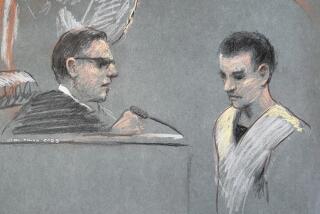Ousted Colonel Defends Use of Marine Planes
- Share via
EL TORO — The former chief of staff for the Marine Corps’ western air bases, speaking at length for the first time since his firing in January, asserted Tuesday that his use of base planes was nothing out of the ordinary and that he was forced out of a job by “small, petty and vindictive” superiors who reneged on their earlier promises.
“It is no surprise to anyone in the Marine Corps that I play golf,” said retired Col. Joseph Underwood, 51, accused earlier this year of flying base planes to Las Vegas, Phoenix, Texas and elsewhere to get in golfing time. Underwood was forced to retire in April.
“And if I thought there was going to be any free time for me to play golf, I brought along my clubs,” said Underwood. “In my view, there is nothing wrong with that.”
Underwood’s remarks come as the man who fired him, Brig. Gen. Wayne T. Adams, is himself the target of an investigation by the Marine Corps inspector general into Adams’ trips to Big Bear, Florida and elsewhere that were disclosed last week in The Times.
In the interview, Underwood offered a new allegation against Adams, who heads the Marines’ four western air bases. Underwood said that Adams used a military plane to get from Burbank to Arizona in 1988 even though he had been told that military regulations prohibited such a trip.
Adams has acknowledged ordering a military plane to return him to the base he then commanded at Yuma, Ariz., from Burbank, where he had gone to be with his family after a granddaughter was killed in a traffic accident.
Adams had chartered a plane to take him and his wife to Burbank. But Underwood said that happened only after he refused to grant Adams access to a base plane for the trip.
At the time, Underwood was based at the Marine Corps Air Station at El Toro and served as chief of staff for the Marine Corps’ four western air bases. Adams was a colonel then.
“It’s clearly not authorized,” Underwood said he told Adams. Underwood said that Adams then got the C-12 Beechcraft to take him back from Burbank by going through his own staff at Yuma, rather than the chief of staff’s office.
During other trips in Marine Corps planes, Adams also signed his divorce papers in Florida after flying there in the midst of a tropical storm, met his fiancee in Big Bear and Washington state, and golfed in Pennsylvania, according to a Times investigation. He has denied any wrongdoing, saying the trips came in order to log flight time or take care of other official business.
In a statement issued through his public affairs officer, Adams declined to discuss any of Underwood’s claims.
Underwood declined to discuss Adams’ use of base planes in depth, focusing his bitterness instead on the military’s handling of his own case.
Retired on April 1, Underwood said that he worked out several deals with the military to quietly end the inquiry into his actions, only to see superior officers at the Marine Corps Air Station at El Toro and in Washington later renege on them because of political pressure.
He said, for example, that in mid-January, on the fourth green of the El Toro base golf course, he struck a deal with Adams under which he would have retired early in exchange for the investigation against him being quietly dropped.
“There have been a lot of other cases in which military guys screw up or it’s perceived they screwed up, and they just kind of drift off into the sunset. . . . they disappear,” said Underwood, a Vietnam veteran who served three decades in the Marines. “That’s what’s expected. I thought it was a done deal--and nothing is more important to officers than their word.”
But then, Col. James Sabow, 51, an assistant and close friend to Underwood, killed himself on Jan. 22 amid allegations involving his own use of base planes. After that, Underwood said, “it all got off track” and military officials pressed ahead with more severe punishment against him.
Underwood maintained that Adams and officials in the inspector general’s office, heading the inquiry, tricked him into submitting his intent to retire at a time when he believed he had struck a deal to end the case against him. Once his retirement was in process, Underwood maintained, he had little leverage in negotiations regarding his punishment.
In February, Underwood pleaded guilty in a closed hearing before Adams to misuse of planes and three other charges, and agreed to make restitution of more than $2,300 and to forfeit about $4,000 in back pay. Saved from a court-martial, he was allowed to retire April 1 and hold onto his lucrative government pension and medical benefits.
Maj. Gen. Hollis Davison, the Marine Corps inspector general and a target of Underwood’s criticism, said in an interview Tuesday that while there may have been negotiations over a resolution to his office’s investigation into Underwood’s case, “I’m not aware of any agreement ever made.”
In the interview, Underwood acknowledged one mistake that was cited in the military’s charges: giving his laundry regularly to his personal driver, a female lance corporal, to drop off at the cleaners during his three years as chief of staff at El Toro.
“The use of the driver to take my laundry--that was poor judgment, and to the American people I apologize,” he said.
But he disputed the other charges against him--including using base planes for golfing jaunts, allowing his daughter to use a military computer at his home for school reports, and coercing another officer to split the prize for a base-improvement plan with him.
The native of Worcester, Mass., said he only agreed to plead guilty to “put it behind me,” since he was near retirement anyway. He said he now sometimes regrets that decision but added: “You have to look in the future, not the past.”
He criticized as “ludicrous” the charge of coercing a lower-ranking officer, a charge he said was not given to him until the day before he met with Adams on the plea agreement.
The issue centered on a device offered by a utility company, which Underwood said saved the base $80,000 last summer by automatically shutting down air-conditioning units during brownouts.
Military officials have said Underwood told Lt. Col. Bonnie Sutherland, who came up with the idea, that he would only forward it to superiors for a possible base-improvement prize if she agreed to split the cash prize with him.
But Underwood insisted that Sutherland only mentioned that she had used the device in her own home, and that he was the one who suggested that it could be used for reducing costs at the base. Sutherland could not be reached for comment.
Underwood returned $750 to Sutherland as part of his plea agreement.
The colonel also said his reported golfing trips around the country arose from a legitimate need to get in flight time. He was paid about $250 a month to maintain his active flight status, but his 1990 flight totals were actually twice the minimum of 50 hours needed.
He maintained that 50 hours is not enough to maintain safe flying habits. “When you fly with someone,” he said, “you don’t want to look like a bozo.”
Underwood also complained about what he called military “harassment,” charging that investigators in January unlawfully seized property from his office and that he had been wrongfully denied access to the base golf course, the officers’ club and other resources.
“After you serve for so long, honorably, faithfully, with combat experience, with lot of friends in the local community,” he said, “it’s a tough way to go.”
More to Read
Get the L.A. Times Politics newsletter
Deeply reported insights into legislation, politics and policy from Sacramento, Washington and beyond. In your inbox twice per week.
You may occasionally receive promotional content from the Los Angeles Times.










